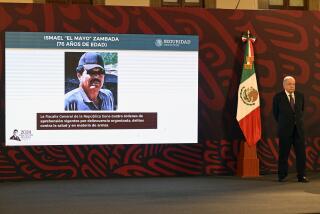Zapatistas, Lawmakers Meet on Indian Rights
- Share via
MEXICO CITY — Ski-masked leaders of Mexico’s Zapatista guerrillas met Monday with congressional mediators in the first serious attempt in nearly five years to address the demands that spurred the rebels’ 1994 uprising in the southern state of Chiapas.
Subcommander Marcos and 23 fellow commanders of the Zapatista National Liberation Army huddled behind closed doors with federal legislators in a university building in the Mexican capital to begin lobbying for Indian rights legislation.
At the conclusion of the two-hour meeting, legislative spokesman Santiago Lopez reported that both sides had committed themselves to “a respectful, frank and cordial dialogue” and that the rebels remain committed “to resolve the conflict through the route of dialogue.”
Lopez, a congressman from Chiapas, did not disclose how the rebels would go forward in pressing their demands with the full Congress. The rebels didn’t comment immediately on the encounter.
The meeting followed the Zapatistas’ tumultuous arrival in Mexico City on Sunday, the culmination of a 16-day pilgrimage by the rebels from their jungle and mountain hide-outs in Chiapas. The caravan was the boldest initiative by the rebels since their brief but bloody insurgency began Jan. 1, 1994, followed by a cease-fire and a negotiating deadlock.
That Monday’s meeting happened at all illustrates the changes that have occurred in the Mexican political landscape in the last year.
After years of acrimony between the government and the Chiapas rebels, President Vicente Fox--whose inauguration Dec. 1 ended seven decades of one-party rule in Mexico--reversed his predecessor’s policy of ignoring the insurgents and rolled out the welcome mat. That led to the bizarre scenario of motorcycle police officers escorting the rebels’ ragged bus caravan through 12 Mexican states and into the capital.
As his first official initiative, Fox submitted to Congress a bill recognizing indigenous autonomy and cultural rights.
The bill flowed from an agreement negotiated in February 1996 by government and rebel delegates but shelved by then-President Ernesto Zedillo, leading to a bitter collapse of talks in September 1996.
Zedillo had argued that the bill would violate individual rights by allowing, for example, traditional Indian forms of community rule that favor open village assemblies over secret ballots.
A number of legislators still share those concerns, including some in Fox’s own center-right party, making passage of the bill far from certain despite Fox’s strong support for it.
But Fox, in reviewing his first 100 days in office, declared Monday, “The government and the Zapatista movement are on the same side on indigenous demands and on the constitutional reforms that consecrate the rights of their peoples.”
Fox even echoed Marcos’ speech Sunday in Mexico City’s giant Zocalo plaza to tens of thousands of supporters. Urging the Zapatistas to take the risk of resuming peace talks, Fox put it this way: “Today, more than ever, we are on the right road to give [the indigenous peoples] a new dawn. Let’s advance without fear toward peace.”
But Marcos has repeatedly expressed suspicion of Fox’s motives and good faith. At a cultural forum earlier Monday, Marcos said, “Fox believes that all struggles in Mexico ended with his arrival in office.”
Marcos has made adoption of the Indian rights legislation one of three conditions for resuming peace talks with the government. The government has partially met other demands on releasing prisoners and closing army bases in Chiapas. The rebels have stressed that they won’t negotiate for peace until the conditions are fully met and that their Mexico City journey is exclusively to lobby for the Indian rights measure.
Earlier in the day, the pipe-puffing Marcos joined a cultural rights panel and traded literary citations with top-ranking European and leftist intellectuals who joined the caravan to show solidarity.
At the forum on a makeshift stage in a soccer field near the rebels’ temporary university quarters, Marcos made it plain that he and Fox have contrasting understandings of the changes that have occurred in Mexico.
“Neoliberalism, which is just a fashion, conceives the current world as the only world,” Marcos said.
Manuel Vazquez Montalban, a Spanish writer, applauded the Chiapas rebels as “pioneers of the new dialectic of this century.” He defended the Zapatistas’ masks, which have been much criticized because they hide the guerrillas’ identities.
“Until the indigenous put on masks, they were invisible,” Vazquez Montalban said. “Once they put on their masks, the ruling powers did see them.”
More to Read
Sign up for Essential California
The most important California stories and recommendations in your inbox every morning.
You may occasionally receive promotional content from the Los Angeles Times.










